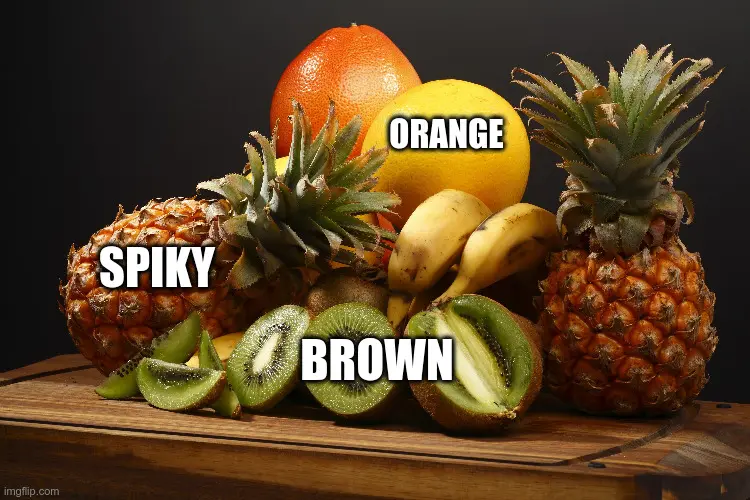Fun fact: the color orange was named after the fruit, and not the fruit named for the color.
Memes
Rules:
- Be civil and nice.
- Try not to excessively repost, as a rule of thumb, wait at least 2 months to do it if you have to.
The word ultimately derives from a Dravidian language – possibly Tamil நாரம் nāram or Telugu నారింజ nāriṃja or Malayalam നാരങ്ങ nāraŋŋa — via Sanskrit नारङ्ग nāraṅgaḥ "orange tree". From there the word entered Persian نارنگ nārang and then Arabic نارنج nāranj. The initial n was lost through rebracketing in Italian and French, though some varieties of Arabic lost the n earlier.
The word "orange" entered Middle English from Old French and Anglo-Norman orenge. The earliest recorded use of the word in English is from the 13th century and referred to the fruit.
It was kept in Spanish tho, naranja.
Same in Hungarian, narancs.
What was the color called before that?
The color was called yellowred before oranges were discovered.
And they spelled it: Geoluread
Basically red. The names for orange and purple are pretty recent inventions, linguistically speaking. That's why we call them red onions and red grapes when they're purple and most "red" birds are actually orange.
Pink as well.some cultures still just refer to pink as "light red". Some cultures don't distinguish between blue and green. Some cultures make specific distinctions between blue and light blue. (see Italian; Azzurro)
Meanwhile, in France:
"What's the roundish thing we eat a lot?"
"Apples?"
"No, the one that grows underground."
"Dirt apples?"
iirc an "apple" in both French and English used to just be any fruit. And over time it shifted to mean just the most common one
and you know the french, always very poetic, of course they'll call a potato a fruit of dirt
Erdäpfel!
Or like we call them "Äräpfl"
We call them "dirt beans" in Mandarin which is an improvement I guess?
Also isn't English the only European language not to call Pineapples some variation of "ananas"?
European Spanish calls it Piña, and Brazilian Portuguese calls it Abacaxi.
Ananás & Abacaxi refer to different types of pineapple. In Portugal we use both. In Brasil, Abacaxi is used because it's the type they have and with time it came to mean all kinds of Ananás.
I think Oranges were named before Carrots. What are these? They're orange....oranges What about these? Oh shit....long pointys?
Carrots weren't generally orange when they were named
This sent me to Wikipedia for kiwifruit, where I read the Chinese characters translate as "macaque peach," but I don't know if that means "peach-ish fruit macaques like to eat" or "peach-ish fruit with fur like a macaque."
I think we can skip the " Chinese gooseberry" interval.
I assume the Kiwi who rebranded them as "kiwifruit" 🥝 intended both "from New Zealand" and "sorta looks like a kiwi bird."
Normal People: Ananas
Fucking English Speakers Somehow: Pineapple
Tbf, there is a resemblance to a pinecone, especially if you're not exactly getting the plumpest, ripest specimens.
& "apple" used to be a generic term for fruit
